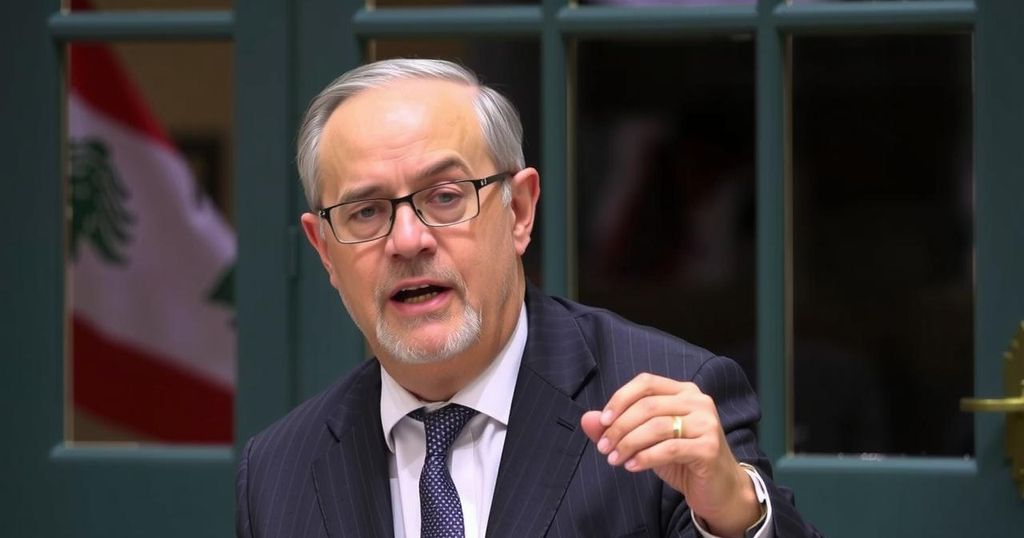Lebanon Prepares for Pivotal Presidential Election Amidst Ongoing Crises

Lebanon is set to elect a new president after over two years without effective leadership. The election occurs amidst ongoing economic and political crises, with Joseph Aoun standing as a strong candidate. Recent political dynamics show Hezbollah’s newfound support for candidates, largely due to the recent ceasefire agreement. The outcome of this election is crucial for restoring legitimate governance and addressing the pressing issues facing Lebanon.
Lebanon is poised to conduct its presidential election this week, marking a significant potential shift after more than two years without an effective president. Under the Lebanese constitution, executive power resides with the prime minister and the Cabinet; however, the transitional government led by Prime Minister Najib Mikati has faced considerable limitations in addressing the nation’s profound political and economic crises. The recent ceasefire agreement between Israel and Hezbollah has created a renewed urgency for a stable presidency capable of leading the country effectively and maintaining peace, given that the ceasefire is set to expire by the end of January.
The context surrounding this election is one of ongoing turmoil, following extensive economic challenges, frozen bank deposits, and a steep decline in the value of the Lebanese pound. Furthermore, an internal conflict has resulted in significant infrastructure damage and critical social issues, such as the approximately 1.3 million displaced individuals within Lebanon, as well as the presence of numerous Syrian refugees seeking to return home.
Michael Bauer, head of the Beirut office of the Konrad Adenauer Foundation, remarked on the need for a president that transcends temporary compromises. He emphasized that merely agreeing on a consensus candidate will not suffice; instead, Lebanon must elect a leader who can symbolize a genuine reboot for the nation. The pressure on political parties has mounted due to the impending election schedule, necessitating serious dialogue and negotiations to present viable candidates.
Under Lebanon’s traditional confessional system, political positions are allocated based on identity and religious affiliation. The front-runner for this election appears to be Joseph Aoun, the Maronite Christian commander-in-chief of the Lebanese Armed Forces. His candidacy has gained traction, reportedly due to Hezbollah’s willingness to support alternatives to their initially favored candidate, Sleiman Frangieh. This shift stems from Hezbollah’s need for a candidate who can enhance their standing post-conflict.
The inherent trust the Lebanese people place in the military may also bolster Aoun’s prospects, as many view him as a figure who can address the security challenges facing Lebanon. Bauer noted that electing “President Joseph Aoun” would signal a hopeful transformation for many citizens, empowering him to tackle pressing safety demands while also benefiting from widespread public support.
The upcoming election serves as a pivotal moment for Lebanon, highlighting the urgent need for political legitimacy. Ronnie Chatah, a Lebanese political analyst stressed that the country must not settle for an interim government but rather strive for an elected administration that can restore a functioning political landscape. As the possibility of electing a president materializes for the first time in two years, this development represents a positive indication of progress for Lebanon’s political future.
In recent years, Lebanon has grappled with a series of escalating crises, including economic collapse, political gridlock, and social unrest. The absence of a legitimate president has compounded these challenges, resulting in a fragile interim government that lacks the authority to initiate substantial reforms. Amid these difficulties, the recent ceasefire agreement between regional powers has intensified calls for a stable and capable leadership to navigate the complexities confronting the nation. The traditional confessional system under which Lebanese politics operate adds layers of complexity to the election process, requiring careful consideration of ethno-religious representation while aiming for consensus and stability in leadership.
In summary, Lebanon’s presidential election represents a critical juncture in the country’s political trajectory, with the potential to restore leadership after a prolonged period without an effective president. The consensus surrounding Joseph Aoun as a candidate reflects a notable shift in political dynamics, especially with Hezbollah’s willingness to support alternative figures. The election’s outcome will be vital in consolidating governance and addressing the multifaceted crises that Lebanon continues to face, heralding a necessary renewal for the nation. As such, Lebanese citizens and stakeholders alike are hopeful that this electoral process will finally pave the way for a stable, functioning government.
Original Source: www.dw.com








